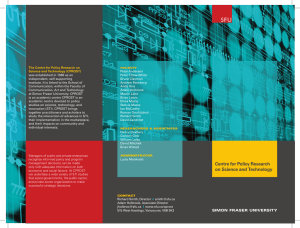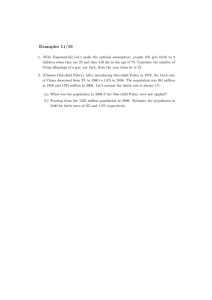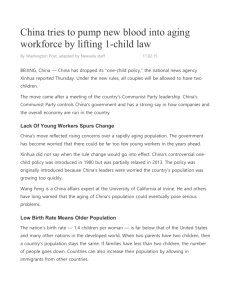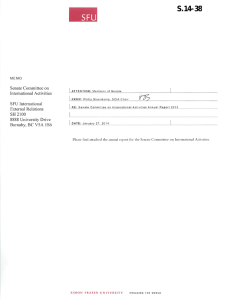Xianjuan (Zoey) Chen
advertisement
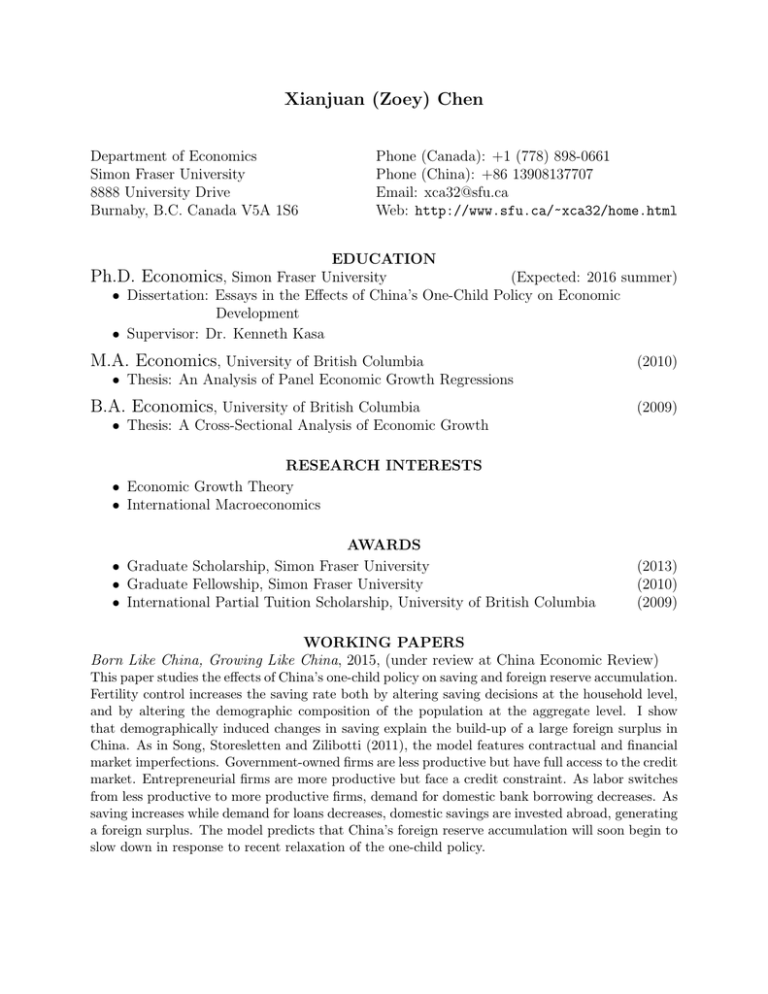
Xianjuan (Zoey) Chen Department of Economics Simon Fraser University 8888 University Drive Burnaby, B.C. Canada V5A 1S6 Phone (Canada): +1 (778) 898-0661 Phone (China): +86 13908137707 Email: xca32@sfu.ca Web: http://www.sfu.ca/~xca32/home.html EDUCATION Ph.D. Economics, Simon Fraser University (Expected: 2016 summer) • Dissertation: Essays in the Effects of China’s One-Child Policy on Economic Development • Supervisor: Dr. Kenneth Kasa M.A. Economics, University of British Columbia (2010) • Thesis: An Analysis of Panel Economic Growth Regressions B.A. Economics, University of British Columbia (2009) • Thesis: A Cross-Sectional Analysis of Economic Growth RESEARCH INTERESTS • Economic Growth Theory • International Macroeconomics AWARDS • Graduate Scholarship, Simon Fraser University • Graduate Fellowship, Simon Fraser University • International Partial Tuition Scholarship, University of British Columbia (2013) (2010) (2009) WORKING PAPERS Born Like China, Growing Like China, 2015, (under review at China Economic Review) This paper studies the effects of China’s one-child policy on saving and foreign reserve accumulation. Fertility control increases the saving rate both by altering saving decisions at the household level, and by altering the demographic composition of the population at the aggregate level. I show that demographically induced changes in saving explain the build-up of a large foreign surplus in China. As in Song, Storesletten and Zilibotti (2011), the model features contractual and financial market imperfections. Government-owned firms are less productive but have full access to the credit market. Entrepreneurial firms are more productive but face a credit constraint. As labor switches from less productive to more productive firms, demand for domestic bank borrowing decreases. As saving increases while demand for loans decreases, domestic savings are invested abroad, generating a foreign surplus. The model predicts that China’s foreign reserve accumulation will soon begin to slow down in response to recent relaxation of the one-child policy. • Population Control, Technology and Economic Growth Motivated by the Galor-Weil (2000) model, this paper examines the long-term effects of China’s one-child policy on economic growth. The new element here is within family integenerational transfers. Following a population control policy, transfers from children decrease as the number of children decreases. In response, parents increase investment in their children’s education in order to compensate for the reduction in transfers. Technological progress is driven by two forces: population size and the level of education. Following population control, the number of children decreases while their average education level increases. Thus, the overall effect on technological progress is ambiguous. Data suggest that education increased following the one-child policy. However, further quantitative analysis is needed in order to isolate the causal effect. • A Quantitative Study of China’s One-Child Policy and Economic Growth In the paper “Population Control and Economic Growth”, Chen (2015) developes a theoretical framework for studying the impact of China’s one-child policy on its long-run economic growth. This paper provides a quantitative exploration of the model. The quantitative performance of the model is evaluated in three steps. First, I parameterize the functions that were given in general form in the original model. Second, reasonable parameter values are chosen in order to assess the quantitative impacts of the policy. Finally, I choose initial conditions and dynamically simulate the model. TEACHING EXPERIENCE Sessional Instructor: Simon Fraser University • Course Title: Principles of Microeconomics • Instructor for a first year economics course with 70 students • Solely developed and directed the course • Planned and delivered a two hours lecture twice a week • Supervised one teaching assistant 2015 Teaching Assistant: Simon Fraser University 2010-2014 • Course Titles: International Finance, International Trade, Principles of Macroeconomics • Organized the tutorials discussions • Explained concepts and terminologies • Held office hours to counsel students experiencing difficulties in the courses University of British Columbia 2009-2010 • Course Title: International Trade OTHERS • Computing Skills: Matlab, Stata, LaTeX • Languages: English, Mandarin, Cantonese REFERENCES Professor Kenneth Kasa Phone: (778) 782-5406 Email: kkasa@sfu.ca Professor Dave Cox Phone: (778)782-5826 Email: dcox@sfu.ca Professor Alex Karaivanov Phone: (778)782-6694 Email: akaraiva@sfu.ca
